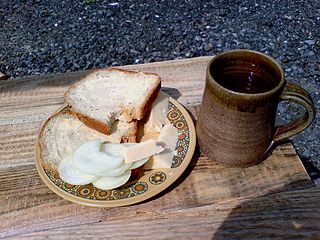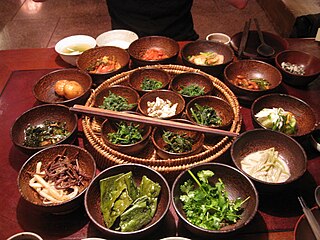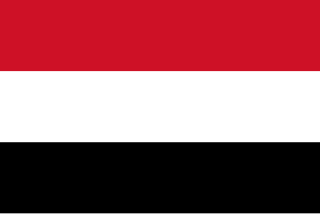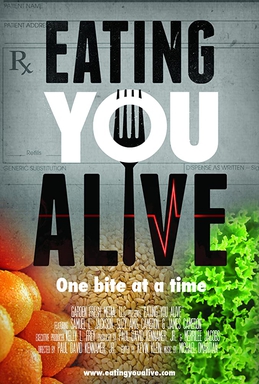Related Research Articles

Brazilian cuisine is the set of cooking practices and traditions of Brazil, and is characterized by European, Amerindian, African, and Asian influences. It varies greatly by region, reflecting the country's mix of native and immigrant populations, and its continental size as well. This has created a national cuisine marked by the preservation of regional differences.

Michel Lotito was a French entertainer, born in Grenoble, famous for deliberate consumption of indigestible objects. He came to be known as Monsieur "Mouth" Mangetout. His digestive system was incredibly resilient, allowing him to consume up to 900 grams of metal per day. He started eating this unusual diet at age 9.

A ploughman's lunch is a British cold meal based around bread, cheese, and fresh or pickled onions. Additional items can be added, such as ham, green salad, hard boiled eggs, and apple, and usual accompaniments are butter and pickle, which in Britain denotes a chutney-like condiment. As its name suggests, it is most commonly eaten at lunchtime. It is particularly associated with pubs, and often served with beer; the saltiness of the cheese was noted to enhance the "relish of the beer."

A flexitarian diet, also called a semi-vegetarian or fauxtarian diet, is one that is centered on plant foods with limited or occasional inclusion of meat. For example, a flexitarian might eat meat only some days each week. Flexitarian is a portmanteau of the words flexible and vegetarian, signifying its followers' less strict diet pattern when compared to vegetarian pattern diets.

Super Size Me is a 2004 American documentary film directed by and starring Morgan Spurlock, an American independent filmmaker. Spurlock's film follows a 30-day period from February 1 to March 2, 2003, during which he claimed to consume only McDonald's food, although he later disclosed he was also drinking heavy amounts of alcohol. The film documents the drastic change on Spurlock's physical and psychological health and well-being. It also explores the fast food industry's corporate influence, including how it encourages poor nutrition for its own profit and gain.

A buffet is a system of serving meals in which food is placed in a public area where the diners serve themselves. A form of service à la française, buffets are offered at various places including hotels, restaurants, and many social events. Buffet restaurants normally offer all-you-can-eat food for a set price, but some measure prices by weight or by number of dishes. Buffets usually have some or mostly hot dishes, so the term cold buffet has been developed to describe formats lacking hot food. Hot or cold buffets usually involve dishware and utensils, but a finger buffet is an array of foods that are designed to be small and easily consumed only by hand, such as cupcakes, slices of pizza, foods on cocktail sticks, etc.

A school meal is a meal provided to students and sometimes teachers at a school, typically in the middle or beginning of the school day. Countries around the world offer various kinds of school meal programs, and altogether, these are among the world's largest social safety nets. An estimated 380 million school children around the world receive meals at their respective schools. The extent of school feeding coverage varies from country to country, and as of 2020, the aggregate coverage rate worldwide is estimated to be 27%.

Conversations regarding the ethics of eating meat are focused on whether or not it is moral to eat non-human animals. Ultimately, this is a debate that has been ongoing for millennia, and it remains one of the most prominent topics in food ethics. Individuals who promote meat consumption do so for a number of reasons, such as health, cultural traditions, religious beliefs, and scientific arguments that support the practice. Those who support meat consumption typically argue that making a meat-free diet mandatory would be wrong because it fails to consider the individual nutritional needs of humans at various stages of life, fails to account for biological differences between the sexes, ignores the reality of human evolution, ignores various cultural considerations, or because it would limit the adaptability of the human species.

Buddhist vegetarianism is the practice of vegetarianism by significant portions of Mahayana Buddhist monastics and laypersons as well as some Buddhists of other sects. In Buddhism, the views on vegetarianism vary between different schools of thought. The Mahayana schools generally recommend a vegetarian diet, claiming that Gautama Buddha set forth in some of the sutras that his followers must not eat the flesh of any sentient being.

Yemeni cuisine is distinct from the wider Middle Eastern cuisines with regional variation. Although some foreign influences are evident in some regions of the country, the Yemeni kitchen is based on similar foundations across the country.
Lunch is a meal eaten around the middle of the day. It is commonly the second meal of the day, after breakfast, but before dinner, and varies in size by culture and region.

Fijian cuisine has long consisted of primarily foraged and farm-grown food. Although rice, wheat, and tea all became staples during Fiji's colonial era, native Fijians still eat primarily tubers and coconuts. The cuisine of Fiji is known for its seafood and various green vegetables, including ''ota'', a young forest fern, and ''bele'', a plant that resembles spinach.

The 100 Mile Challenge is a Canadian reality television series produced by Paperny Entertainment and aired on Food Network Canada. The series follows the lives and eating habits of six families living in Mission, British Columbia, who, for a period of 100 days, agreed to only consume food and drink that has been grown, raised and produced within a 100-mile radius from Mission. The series is based on the concept of local food consumption as described in the book The 100-Mile Diet authored by J.B. MacKinnon and Alisa Smith where the two authors describe their experience of eating locally for one full year. To coincide with the premiere of the series, FoodTV.ca launched a companion website that Canwest described as "the largest, most innovative and interactive companion website to a series to date".

Prison food is the term for meals served to prisoners while incarcerated in correctional institutions. While some prisons prepare their own food, many use staff from on-site catering companies. Some prisons support the dietary requirements of specific religions, as well as vegetarianism. Prisoners will typically receive a series of standard meals per day from the prison, but in many prisons they can supplement their diets by purchasing additional foods, including snacks and desserts, at the prison commissary with money earned from working in the prison or sent by family and friends.
NeverSeconds is a blog created and run by Scottish schoolgirl Martha Payne in 2012. On it, she expressed her thoughts and experiences of eating school meals at her primary school in Lochgilphead. The blog received a great deal of public attention and international press coverage after the Argyll and Bute Council tried to ban the child from posting photos of the lunchtime meals served at her school. After being used to help raise more than £143,000 of donations to the Mary's Meals charity via JustGiving in support of school feeding programmes for impoverished communities around the world, the blog ceased to be updated after less than two years of operation.

A meal is an eating occasion that takes place at a certain time and includes consumption of food. The names used for specific meals in English vary, depending on the speaker's culture, the time of day, or the size of the meal.
Leanne Ratcliffe is an Australian YouTube personality, vegan activist, speaker, and author. She is the creator of the YouTube channel Freelee The BananaGirl, where she talks about her diet, exercise and lifestyle. Her channel accumulated over 790 thousand subscribers and 330 million views.

The egg and wine diet is a fad diet that was popularized in 1964 and revived in 2018 on social media platforms.

Eating You Alive is a 2018 health documentary film about why Americans are suffering from chronic diseases such as cardiovascular disease, diabetes, obesity, autoimmune disease, among other diseases, and whether the outcome can be changed.
References
- 1 2 3 Toyama, Michiko (17 October 2008). "Japan Goes Bananas for a New Diet". Time. Archived from the original on October 18, 2008.
- ↑ David Rhodes (13 September 2015). "Can eating more than six bananas at once kill you?". BBC News. Retrieved 2021-04-07.
- ↑ Parker, Eloise (October 22, 2008). "The Morning Banana Diet may be the cheapest, easiest ever. But does it work? - NY Daily News". Daily News (New York).